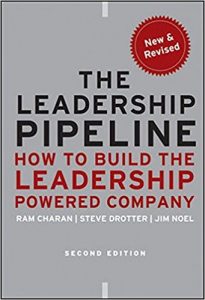The Leadership Pipeline
Author: Ram Charan, Stephen Drotter, James Noel
Genre: Management
If there is one book that every ambitious manager MUST read, it is this. Why do careers hit a glass ceiling? Why do promising, hard working, intelligent young managers fail to make the cut to be promoted to the next level? The authors argue that starting at an entry level analyst to the CEO of the company, there are 6 big transition roles – first becoming a manager, then a manager of managers, then a function head and so on. Each of these require a very distinct set of incremental skills. People need to start exhibiting these new skills before they can be considered for promotion. You could be delivering good performance at the current level, but still not considered for the next level, because what got you here, won’t get you there. The skill set requirement is different.
In contrast, researchers have found that successful managers learnt new skills as they moved up, changed their perspective on what was important and reprioritized where to spend time. The book highlights distinct levels of Leadership, each requiring new set of skills and priorities.
1.Managing Self: The individual contributor stage first few years in our career. The key skills required for success here are primarily:
- Technical – Subject Matter Knowledge, Quality of output, Consistency
- Professional – Basic professionalism and discipline, accepting company values and norms, doing assigned work within given time frame
People who do this well are often promoted to the next level, where new skills become important.
- Managing Others: As we start having direct reports, the older skills of technical competence and professionalism become a minimum requirement. Some very new skills start mattering:
- Planning: Breaking overall deliverable into smaller chunks, with a time bound action plan
- Assigning/Delegating Tasks: Who will do what? based on interest and capability
- Recruiting team: What skill sets are required and how to measure a candidate against each
- Motivating/Inspiring: Seen as a charismatic leader who people look up to for inspiration
- Monitoring/Measuring the work of others: Regular follow-ups on KRA and Action Plans
- Coaching/Enabling: Giving specific feedback, then following up to ensure improvement
- Accountability: Taking full accountability of results, without giving excuses
The aha moment is that none of these skills are a requirement at the first level of individual performers. So one can be a great analyst without having any of the qualities required to be promoted to a manager.





 This information will never be shared with third party
This information will never be shared with third party
Great compilation here. I am sharing this with my team..
It has really come out well Nishant.